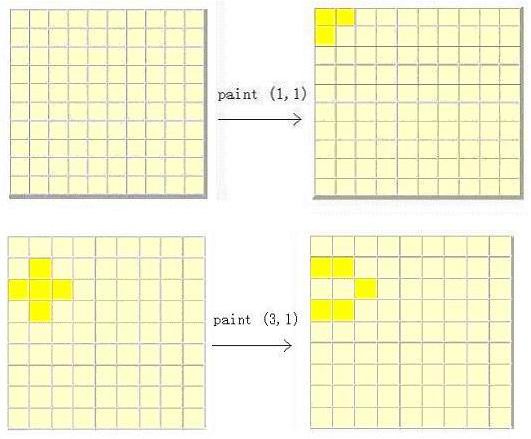- android实践:canvas文字图片旋转显示
汤面不加鱼丸
android前端javascript
问题:如何在手机竖屏模式下将文字/图片旋转显示,即类似横屏方向上显示显示效果:实现:1.文字旋转显示canvas.save();//保存状态入栈canvas.translate(getWidth()>>1,getHeight()>>1);//显示中心PainttitlePaint=newPaint();titlePaint.setColor(Color.WHITE);titlePaint.setT
- 【Flutter】时间轴高度自适应最佳实践
Tech Ranger
FlutterAndroidflutter
1使用部件画圆圈:使用canvas.drawCircle和属性为_paint.style=PaintingStyle.fill;画笔画两个实心圆;画竖线:使用canvas.drawLine和属性为_paint.style=PaintingStyle.stroke;的画笔画直线,通过p1和p2两个端点使直线为竖线在Container中调用decoration组件使用BorderTimeLine类。d
- Python视觉实战项目31讲源码地址
机械小蛟龙
笔记opencvpython深度学习
Python视觉实战项目31讲源码地址来源:公众号小白学视觉2月1日使用OpenCV实现猜词游戏https://github.com/spmallick/learnopencv/tree/master/Hangman使用OpenCV实现图像修复https://github.com/spmallick/learnopencv/tree/master/Image-Inpainting自适应显着性的图像
- 推荐项目:hedera——Unity的3D常春藤模拟生长工具
施刚爽
推荐项目:hedera——Unity的3D常春藤模拟生长工具hederapaint3DivyintheUnityEditor,watchprocedurallygeneratedmeshessimulategrowthandclinginginreal-time项目地址:https://gitcode.com/gh_mirrors/he/hedera项目介绍hedera是一个专门为Unity开发者
- 第五节 渲染机制与性能-回流与重绘优化
泽泽爱旅行
css前端javascripthtml
以下是关于回流(Reflow)与重绘(Repaint)优化的全面解析,结合核心原理、触发条件、性能影响及优化策略,帮助开发者深入理解并高效解决渲染性能问题。一、回流与重绘的核心概念回流(Reflow)定义:当元素的几何属性(如尺寸、位置、布局)发生变化时,浏览器需要重新计算渲染树(RenderTree)并更新页面布局,这一过程称为回流。触发条件:修改元素的width、height、margin、p
- python 通达信板块_[python]沪深龙虎榜数据导入通达信的自选板块,并标注于K线图上...
二号方脑壳
python通达信板块
将沪深龙虎榜数据导入通达信的自选板块,并标注于K线图上原理:python读取前一次处理完的计算5日后涨跌幅输出的csv文件文件名前加"[paint]"安照通达信的画图文件和板块文件格式,输出文件用通达信的导入功能,导入画图文件和板块文件即可事前数据截图:处理后所得文件:导入通达信后板块截图:k线截图:代码:#coding=utf-8#读取'[paint]'开头的csv文件#copyright@Wa
- C. Two Colors-Educational Codeforces Round 176 (Rated for Div. 2)
9527过了头
codeforces刷题算法c++数据结构
Monocarphasinstalledanewfenceathissummerhouse.Thefenceconsistsofnplanksofthesamesizearrangedinarow.Monocarpdecidedthathewouldpainthisfenceaccordingtothefollowingrules:eachplankofthefencewillbepaintedi
- 【图论 DFS搜索树】P10298 [CCC 2024 S4] Painting Roads|普及+
软件架构师何志丹
#洛谷普及+图论深度优先算法c++洛谷
本文涉及知识点C++图论C++DFSP10298[CCC2024S4]PaintingRoads题目描述Kitchener市的市长Alanna成功地改进了该市的道路规划。然而,来自RedBlue市的一位售货员仍然抱怨道路的颜色不够丰富。Alanna的下一个任务就是粉刷一些道路。Kitchener市的道路规划可以表示为NNN个十字路口和MMM条道路,第iii条道路连接第uiu_iui个十字路口和第v
- Qt中opengl使用swapBuffers()函数报错解决办法
啊 哈
QTOPENGL
swapBuffers():qt文档中方的翻译:用屏幕外缓冲区交换屏幕内容。仅当窗口小部件的格式指定双缓冲模式时,此方法才有效。通常,不需要显式调用此函数,因为它是在每个小部件重新绘制后(即每次执行paintGL()之后)自动完成的。我是在线程中使用swapBuffers时候报下面这个错。报错:QOpenGLContext::swapBuffers()calledwithnon-exposedwi
- 2025角色建模学习一
wsdchong之小马过河
学习
2025角色建模学习一前言前几天写了2025角色建模学习思路-CSDN博客,今天就进一步完善细节。目标:熟练使用资源,适度修改。之所以是这个目标就是,完全自己创造一个新模型要耗很大精力,所以为了节约精力,前期目标是快速完成一个还凑合的角色模型,包含角色、服装、道具、动作等等。内容涉及到的软件如下ZBrush:角色雕刻MarvelousDesigner:角色服装substancepainter:材质
- Incremental Transformer Structure EnhancedImage Inpainting with Masking Positional Encoding笔记
毕设做完了吗?
transformer笔记深度学习
摘要:近年来,图像修复取得了重大进展。然而,恢复具有生动纹理和合理结构的损坏图像仍然具有挑战性。由于卷积神经网络(CNN)的感受野有限,一些特定方法只能处理常规纹理,同时失去整体结构。另一方面,基于注意力的模型可以更好地学习结构恢复的长程依赖性,但它们受到大图像尺寸推理的大量计算的限制。为了解决这些问题,我们建议利用一个额外的结构恢复器来促进图像的增量修复。所提出的模型在固定的低分辨率草图空间中,
- flutter 页面加载动画_十、Flutter加载动画
蜜桃厨房
flutter页面加载动画
目录一、效果展示二、RoundPainter三、RoundProgress四、旋转起来五、停止旋转一、效果展示Flutter加载动画.jpg二、RoundPainter同上篇文章《九、Flutter水波动画》画水波原理是一样的,都是通过画笔呈现不规则图形。this.offsetList是存储加载的动画里面的实心圆的坐标,通过drawCircle方法把坐标画到画布上。@overridevoidpai
- Qt 窗口部件 QMainWindow、QWidget、QDialog 使用原则
高亚奇
上位机框架C++QT上位机框架python+pyQTqt开发语言
在平常qt开发中,通常要写自己的窗口类,那么这个窗口类该继承自哪个类呢?QWidget继承于QObject和QPaintDevice,QDialog和QMainWindow则继承于QWidget。QT提供的默认基类只有QMainWindow、QWidget、和QDialog这三种,这三种窗体也是用的最多的,QMainWindow是带有菜单栏和工具栏的主窗口类,QDialog是各种对话框的基类,而他
- Learning to Incorporate Structure Knowledge for Image Inpainting
yijun009
图像修复论文
LearningtoIncorporateStructureKnowledgeforImageInpaintingMotivationMethods框架:AttentionLayerStructureEmbeddingLayerPyramidStructureLossExperimentreference原文链接:link.Motivation图像修复旨在用合理且充满细节的内容填充损坏的图像区域或
- 前端性能调优工具与指标
BitCat
前端工程化前端面试
性能指标解析核心Web指标核心Web指标(CoreWebVitals)是Google定义的一组关键性能指标,直接影响用户体验和SEO排名:FCP(FirstContentfulPaint):首次内容绘制,记录页面首次渲染任何文本、图像、非白色画布或SVG的时间点优:3.0sLCP(LargestContentfulPaint):最大内容绘制,衡量视口中最大内容元素的渲染时间优:4.0sCLS(Cu
- web性能优化
性能优化步骤:确定性能指标使用专业工具测量性能表现找到表现不佳的改进点技术改造,性能回归测试性能指标——基于用户体验的性能指标FirstContentfulPaint(FCP):首个内容加载时间LargestContentfulPaint(LCP):最大内容加载时间FirstInputDelay(FID):首次可输入延迟TimetoIneractive(TTI):可交互时间TotalBlockin
- 小程序的配置和架构
一、小程序的双线程模型1.小程序的架构模型谁是小程序的宿主环境呢?微信客户端宿主环境为了执行小程序的各种文件:wxml文件、wxss文件、js文件当小程序基于WebView环境下时,WebView的JS逻辑、DOM树创建、CSS解析、样式计算、Layout、Paint(Composite)都发生在同一线程,在WebView上执行过多的JS逻辑可能阻塞渲染,导致界面卡顿。以此为前提,小程序同时考虑了
- CSS高级技巧
天涯学馆
大前端&移动端全栈架构css前端
CSSHoudini利用CSSHoudiniAPIs(如PaintAPI、Properties&ValuesAPI等)编写低级图形渲染和自定义CSS属性。目前仍处于实验阶段,但提供了更多对CSS底层的访问
- Qt工作总结05 <QPainter 绘制正态分布曲线>
Kilicc_
Qt工作总结开发语言qt工作总结
一、使用QPainter(不涉及场景)1.步骤计算数据的均值和标准差:计算数据的均值(μ)和标准差(σ)。定义正态分布函数:使用正态分布的概率密度函数(PDF)来计算每个点的值。绘制曲线:使用Qt的绘图功能(如QPainter)来绘制曲线。2、例子2.1.代码数据准备:data是绘制正态分布曲线的数据集。计算均值和标准差:calculateMeanAndStdDev函数计算数据的均值和标准差。正态
- 小程序动画性能提升指南:CSS硬件加速与JavaScript动画框架对比
在追求流畅交互的小程序开发中,动画性能是决定用户体验的关键指标。本文将从底层原理出发,深度对比CSS硬件加速动画与JavaScript动画框架的优劣,并提供针对不同场景的性能优化方案。一、动画性能的核心瓶颈小程序动画的卡顿通常源于三大性能杀手:主线程阻塞:JS单线程执行机制导致动画计算与页面渲染竞争资源重绘重排成本:布局变化触发浏览器回流(Reflow)与重绘(Repaint)渲染层合并损耗:多层
- error C2248: “CObject::CObject”: 无法访问 private 成员(在“CObject”类中声明)此诊断出现在编译器生成的函数“CDC::CDC(const CDC &)
小新110
CDC
onPaint中内容太多,我就想把部分代码封装成函数,直接调用,然后里面用到了CPaintDCdc,然后我就直接传进去了,然后就报错了:1>c:\programfiles(x86)\microsoftvisualstudio10.0\vc\atlmfc\include\afxwin.h(1018):errorC2248:“CObject::CObject”:无法访问private成员(在“CObj
- PYQT5 自定义重写QWidget后无法设置样式
背影_LEI
qtpython开发语言
不知道有没有重写QWidget后,设置的样式不生效的兄弟们。需要在类里面重写paintEvent方法,样式设置就不会丢了哦。fromPyQt5.QtGuiimportQPainterfromPyQt5.QtWidgetsimportQWidget,QStyleOption,QStyleclassMyWidget(QWidget):def__init__(self,parent=None
- Qt客户端技巧 -- 窗口美化 -- 圆角窗口
tadus_zeng
c++客户端qt
不解析,直接给代码例子利用窗口重绘事件处理函数paintEventmain.cpp#include#ifQT_VERSION>=0x050000#include#else#include#endif#include"roundedwindow.h"intmain(intargc,char*argv[]){QApplicationa(argc,argv);RoundedWindowwnd{};wnd
- 什么是重绘(Repaint)和回流(Reflow)?如何优化?
破碎的天堂鸟
学习教程前端javascripthtml
一、重绘(Repaint)与回流(Reflow)的定义与区别1.重绘(Repaint)定义:当元素的外观属性(如颜色、背景、可见性等)发生变化,但不影响其在文档流中的布局和几何尺寸时,浏览器会重新绘制该元素,此过程称为重绘。触发条件:修改颜色、背景色、边框颜色、透明度、阴影等非几何属性。修改visibility属性(如visibility:hidden)。性能影响:重绘不涉及布局计算,因此开销较小
- 多模态图像修复系统:基于深度学习的图片修复实现
神经网络15044
仿真模型python算法深度学习人工智能
多模态图像修复系统:基于深度学习的图片修复实现1.系统概述本系统使用多模态大模型(StableDiffusionInpainting)实现图像修复功能,结合文本描述和图片输入,对指定区域进行内容修复。系统包含完整的数据处理、模型训练、推理部署流程。importtorchimportnumpyasnpfromPILimportImage,ImageDrawfromdiffusersimportSta
- CSS 性能优化
超级土豆粉
[实习&校招]前端CSS面试指南css性能优化前端
目录CSS性能优化CSS提高性能的方法1.选择器优化1.1选择器性能原则1.2选择器优化示例2.重排(Reflow)和重绘(Repaint)优化2.1重排和重绘的概念2.2触发重排的操作2.3触发重绘的操作2.4优化重排和重绘的方法3.资源优化3.1CSS文件优化3.2图片资源优化4.加载优化4.1关键CSS优化4.2媒体查询优化5.其他优化建议CSS性能优化CSS提高性能的方法1.选择器优化1.
- Android自定义View 纯色背景打洞
皮皮高
android
packagecom.ppg.mylibrary.a;importandroid.content.Context;importandroid.graphics.Canvas;importandroid.graphics.Color;importandroid.graphics.DashPathEffect;importandroid.graphics.Paint;importandroid.gra
- React 性能监控与错误上报
BitCat
Reactreact.js前端前端框架面试
核心问题与技术挑战现代React应用随着业务复杂度增加,性能问题和运行时错误日益成为影响用户体验的关键因素。没有可靠的监控与错误上报机制,我们将陷入被动修复而非主动预防的困境。性能指标体系与错误分类关键性能指标定义//performance-metrics.jsexportconstPERFORMANCE_METRICS={//页面加载指标FP:'first-paint',//首次绘制FCP:'f
- 深入探讨 JavaScript 性能瓶颈并分享优化技巧与最佳实践
I'm兰陵王
JavaScriptvue.js前端html5javascript
深入探讨JavaScript性能瓶颈并分享优化技巧与最佳实践,可以帮助开发者编写更高效和响应更快的前端代码。以下是一些常见的性能瓶颈及其对应的优化策略。一、常见的JavaScript性能瓶颈频繁的DOM操作原因:直接操作实际DOM是非常昂贵的,会导致重绘(Repaint)和重排(Reflow)。影响:频繁的重排和重绘会显著降低性能,尤其是在移动设备上。复杂的循环和算法原因:低效的循环和算法会增加计
- Qt事件处理的顺序
七哥粤
Qt编程事件QTQT事件
Qt的事件处理,实际上是有五个层次:1.重写paintEvent()、mouseXXXEvent()等事件处理函数。这是最普通、最简单的形式,同时功能也最简单。2.重写event()函数。event()函数是所有对象的事件入口,QObject和QWidget中的实现,默认是把事件传递给特定的事件处理函数。3.在特定对象上面安装事件过滤器。该过滤器仅过滤该对象接收到的事件。4.在QCoreAppli
- 项目中 枚举与注解的结合使用
飞翔的马甲
javaenumannotation
前言:版本兼容,一直是迭代开发头疼的事,最近新版本加上了支持新题型,如果新创建一份问卷包含了新题型,那旧版本客户端就不支持,如果新创建的问卷不包含新题型,那么新旧客户端都支持。这里面我们通过给问卷类型枚举增加自定义注解的方式完成。顺便巩固下枚举与注解。
一、枚举
1.在创建枚举类的时候,该类已继承java.lang.Enum类,所以自定义枚举类无法继承别的类,但可以实现接口。
- 【Scala十七】Scala核心十一:下划线_的用法
bit1129
scala
下划线_在Scala中广泛应用,_的基本含义是作为占位符使用。_在使用时是出问题非常多的地方,本文将不断完善_的使用场景以及所表达的含义
1. 在高阶函数中使用
scala> val list = List(-3,8,7,9)
list: List[Int] = List(-3, 8, 7, 9)
scala> list.filter(_ > 7)
r
- web缓存基础:术语、http报头和缓存策略
dalan_123
Web
对于很多人来说,去访问某一个站点,若是该站点能够提供智能化的内容缓存来提高用户体验,那么最终该站点的访问者将络绎不绝。缓存或者对之前的请求临时存储,是http协议实现中最核心的内容分发策略之一。分发路径中的组件均可以缓存内容来加速后续的请求,这是受控于对该内容所声明的缓存策略。接下来将讨web内容缓存策略的基本概念,具体包括如如何选择缓存策略以保证互联网范围内的缓存能够正确处理的您的内容,并谈论下
- crontab 问题
周凡杨
linuxcrontabunix
一: 0481-079 Reached a symbol that is not expected.
背景:
*/5 * * * * /usr/IBMIHS/rsync.sh
- 让tomcat支持2级域名共享session
g21121
session
tomcat默认情况下是不支持2级域名共享session的,所有有些情况下登陆后从主域名跳转到子域名会发生链接session不相同的情况,但是只需修改几处配置就可以了。
打开tomcat下conf下context.xml文件
找到Context标签,修改为如下内容
如果你的域名是www.test.com
<Context sessionCookiePath="/path&q
- web报表工具FineReport常用函数的用法总结(数学和三角函数)
老A不折腾
Webfinereport总结
ABS
ABS(number):返回指定数字的绝对值。绝对值是指没有正负符号的数值。
Number:需要求出绝对值的任意实数。
示例:
ABS(-1.5)等于1.5。
ABS(0)等于0。
ABS(2.5)等于2.5。
ACOS
ACOS(number):返回指定数值的反余弦值。反余弦值为一个角度,返回角度以弧度形式表示。
Number:需要返回角
- linux 启动java进程 sh文件
墙头上一根草
linuxshelljar
#!/bin/bash
#初始化服务器的进程PId变量
user_pid=0;
robot_pid=0;
loadlort_pid=0;
gateway_pid=0;
#########
#检查相关服务器是否启动成功
#说明:
#使用JDK自带的JPS命令及grep命令组合,准确查找pid
#jps 加 l 参数,表示显示java的完整包路径
#使用awk,分割出pid
- 我的spring学习笔记5-如何使用ApplicationContext替换BeanFactory
aijuans
Spring 3 系列
如何使用ApplicationContext替换BeanFactory?
package onlyfun.caterpillar.device;
import org.springframework.beans.factory.BeanFactory;
import org.springframework.beans.factory.xml.XmlBeanFactory;
import
- Linux 内存使用方法详细解析
annan211
linux内存Linux内存解析
来源 http://blog.jobbole.com/45748/
我是一名程序员,那么我在这里以一个程序员的角度来讲解Linux内存的使用。
一提到内存管理,我们头脑中闪出的两个概念,就是虚拟内存,与物理内存。这两个概念主要来自于linux内核的支持。
Linux在内存管理上份为两级,一级是线性区,类似于00c73000-00c88000,对应于虚拟内存,它实际上不占用
- 数据库的单表查询常用命令及使用方法(-)
百合不是茶
oracle函数单表查询
创建数据库;
--建表
create table bloguser(username varchar2(20),userage number(10),usersex char(2));
创建bloguser表,里面有三个字段
&nbs
- 多线程基础知识
bijian1013
java多线程threadjava多线程
一.进程和线程
进程就是一个在内存中独立运行的程序,有自己的地址空间。如正在运行的写字板程序就是一个进程。
“多任务”:指操作系统能同时运行多个进程(程序)。如WINDOWS系统可以同时运行写字板程序、画图程序、WORD、Eclipse等。
线程:是进程内部单一的一个顺序控制流。
线程和进程
a. 每个进程都有独立的
- fastjson简单使用实例
bijian1013
fastjson
一.简介
阿里巴巴fastjson是一个Java语言编写的高性能功能完善的JSON库。它采用一种“假定有序快速匹配”的算法,把JSON Parse的性能提升到极致,是目前Java语言中最快的JSON库;包括“序列化”和“反序列化”两部分,它具备如下特征:
- 【RPC框架Burlap】Spring集成Burlap
bit1129
spring
Burlap和Hessian同属于codehaus的RPC调用框架,但是Burlap已经几年不更新,所以Spring在4.0里已经将Burlap的支持置为Deprecated,所以在选择RPC框架时,不应该考虑Burlap了。
这篇文章还是记录下Burlap的用法吧,主要是复制粘贴了Hessian与Spring集成一文,【RPC框架Hessian四】Hessian与Spring集成
- 【Mahout一】基于Mahout 命令参数含义
bit1129
Mahout
1. mahout seqdirectory
$ mahout seqdirectory
--input (-i) input Path to job input directory(原始文本文件).
--output (-o) output The directory pathna
- linux使用flock文件锁解决脚本重复执行问题
ronin47
linux lock 重复执行
linux的crontab命令,可以定时执行操作,最小周期是每分钟执行一次。关于crontab实现每秒执行可参考我之前的文章《linux crontab 实现每秒执行》现在有个问题,如果设定了任务每分钟执行一次,但有可能一分钟内任务并没有执行完成,这时系统会再执行任务。导致两个相同的任务在执行。
例如:
<?
//
test
.php
- java-74-数组中有一个数字出现的次数超过了数组长度的一半,找出这个数字
bylijinnan
java
public class OcuppyMoreThanHalf {
/**
* Q74 数组中有一个数字出现的次数超过了数组长度的一半,找出这个数字
* two solutions:
* 1.O(n)
* see <beauty of coding>--每次删除两个不同的数字,不改变数组的特性
* 2.O(nlogn)
* 排序。中间
- linux 系统相关命令
candiio
linux
系统参数
cat /proc/cpuinfo cpu相关参数
cat /proc/meminfo 内存相关参数
cat /proc/loadavg 负载情况
性能参数
1)top
M:按内存使用排序
P:按CPU占用排序
1:显示各CPU的使用情况
k:kill进程
o:更多排序规则
回车:刷新数据
2)ulimit
ulimit -a:显示本用户的系统限制参
- [经营与资产]保持独立性和稳定性对于软件开发的重要意义
comsci
软件开发
一个软件的架构从诞生到成熟,中间要经过很多次的修正和改造
如果在这个过程中,外界的其它行业的资本不断的介入这种软件架构的升级过程中
那么软件开发者原有的设计思想和开发路线
- 在CentOS5.5上编译OpenJDK6
Cwind
linuxOpenJDK
几番周折终于在自己的CentOS5.5上编译成功了OpenJDK6,将编译过程和遇到的问题作一简要记录,备查。
0. OpenJDK介绍
OpenJDK是Sun(现Oracle)公司发布的基于GPL许可的Java平台的实现。其优点:
1、它的核心代码与同时期Sun(-> Oracle)的产品版基本上是一样的,血统纯正,不用担心性能问题,也基本上没什么兼容性问题;(代码上最主要的差异是
- java乱码问题
dashuaifu
java乱码问题js中文乱码
swfupload上传文件参数值为中文传递到后台接收中文乱码 在js中用setPostParams({"tag" : encodeURI( document.getElementByIdx_x("filetag").value,"utf-8")});
然后在servlet中String t
- cygwin很多命令显示command not found的解决办法
dcj3sjt126com
cygwin
cygwin很多命令显示command not found的解决办法
修改cygwin.BAT文件如下
@echo off
D:
set CYGWIN=tty notitle glob
set PATH=%PATH%;d:\cygwin\bin;d:\cygwin\sbin;d:\cygwin\usr\bin;d:\cygwin\usr\sbin;d:\cygwin\us
- [介绍]从 Yii 1.1 升级
dcj3sjt126com
PHPyii2
2.0 版框架是完全重写的,在 1.1 和 2.0 两个版本之间存在相当多差异。因此从 1.1 版升级并不像小版本间的跨越那么简单,通过本指南你将会了解两个版本间主要的不同之处。
如果你之前没有用过 Yii 1.1,可以跳过本章,直接从"入门篇"开始读起。
请注意,Yii 2.0 引入了很多本章并没有涉及到的新功能。强烈建议你通读整部权威指南来了解所有新特性。这样有可能会发
- Linux SSH免登录配置总结
eksliang
ssh-keygenLinux SSH免登录认证Linux SSH互信
转载请出自出处:http://eksliang.iteye.com/blog/2187265 一、原理
我们使用ssh-keygen在ServerA上生成私钥跟公钥,将生成的公钥拷贝到远程机器ServerB上后,就可以使用ssh命令无需密码登录到另外一台机器ServerB上。
生成公钥与私钥有两种加密方式,第一种是
- 手势滑动销毁Activity
gundumw100
android
老是效仿ios,做android的真悲催!
有需求:需要手势滑动销毁一个Activity
怎么办尼?自己写?
不用~,网上先问一下百度。
结果:
http://blog.csdn.net/xiaanming/article/details/20934541
首先将你需要的Activity继承SwipeBackActivity,它会在你的布局根目录新增一层SwipeBackLay
- JavaScript变换表格边框颜色
ini
JavaScripthtmlWebhtml5css
效果查看:http://hovertree.com/texiao/js/2.htm代码如下,保存到HTML文件也可以查看效果:
<html>
<head>
<meta charset="utf-8">
<title>表格边框变换颜色代码-何问起</title>
</head>
<body&
- Kafka Rest : Confluent
kane_xie
kafkaRESTconfluent
最近拿到一个kafka rest的需求,但kafka暂时还没有提供rest api(应该是有在开发中,毕竟rest这么火),上网搜了一下,找到一个Confluent Platform,本文简单介绍一下安装。
这里插一句,给大家推荐一个九尾搜索,原名叫谷粉SOSO,不想fanqiang谷歌的可以用这个。以前在外企用谷歌用习惯了,出来之后用度娘搜技术问题,那匹配度简直感人。
环境声明:Ubu
- Calender不是单例
men4661273
单例Calender
在我们使用Calender的时候,使用过Calendar.getInstance()来获取一个日期类的对象,这种方式跟单例的获取方式一样,那么它到底是不是单例呢,如果是单例的话,一个对象修改内容之后,另外一个线程中的数据不久乱套了吗?从试验以及源码中可以得出,Calendar不是单例。
测试:
Calendar c1 =
- 线程内存和主内存之间联系
qifeifei
java thread
1, java多线程共享主内存中变量的时候,一共会经过几个阶段,
lock:将主内存中的变量锁定,为一个线程所独占。
unclock:将lock加的锁定解除,此时其它的线程可以有机会访问此变量。
read:将主内存中的变量值读到工作内存当中。
load:将read读取的值保存到工作内存中的变量副本中。
- schedule和scheduleAtFixedRate
tangqi609567707
javatimerschedule
原文地址:http://blog.csdn.net/weidan1121/article/details/527307
import java.util.Timer;import java.util.TimerTask;import java.util.Date;
/** * @author vincent */public class TimerTest {
- erlang 部署
wudixiaotie
erlang
1.如果在启动节点的时候报这个错 :
{"init terminating in do_boot",{'cannot load',elf_format,get_files}}
则需要在reltool.config中加入
{app, hipe, [{incl_cond, exclude}]},
2.当generate时,遇到:
ERROR

